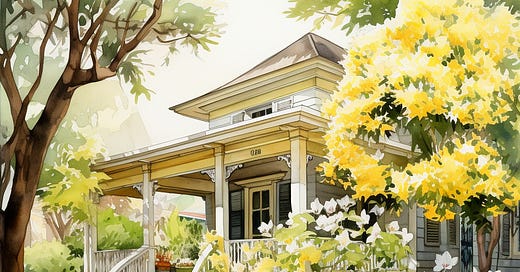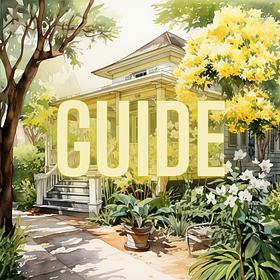Julie sat alone on the veranda of the charming South-French house. The last time she was here was in the summer of 1987. Before that, she spent every single summer, every day, with her grandparents. Her father would visit her on weekends until September when school began, and they would return to Nantes.
Julie first spent her summer with her paternal grandparents when she was two. For that year and six more, her mother always accompanied her. She still remembered how they would sit outside on the veranda in the evenings, sipping raspberry syrup, as her mother told her stories about the local wildlife. Julie would snuggle close to her mother, taking comfort in her scent, which felt safe and familiar.
Sonja, a second-generation Russian immigrant in France, adored Julie. After trying for a long time with her husband, Sonja finally became pregnant. The day she held her newborn daughter was the happiest day of her life. She gave Julie everything she could, never entrusting her to anyone else. She was always nearby, just in case Julie needed her, even when the three-year-old wanted to explore the vast and intimidating garden in the South of France on her own. Sonja would sit on the veranda, pretending to be engrossed in her book, but in reality, she was watching her daughter's every move, grateful to Lautrec, the French bulldog owned by her in-laws, for accompanying her child.
Julie remembered how many times she looked back at her mother. When she had a tantrum about wanting to go alone, she hadn't thought about how expansive the garden was, how the young magnolia tree seemed so intimidating, with its potential to hide any strange creature behind it. As Julie ventured further from the veranda, her confidence dwindled. Sonja noticed Julie wandering more sideways than venturing further out into the garden. She could sense her daughter's inner struggle between her fear and pride. Picking up the sunscreen from the table, Sonja took the forty steps separating them.
As Julie saw her mother approaching, pride flashed across her face, but Sonja reassured her from a distance that she just wanted to apply sunscreen to protect her pale skin, inherited from her mother. Reluctantly, Julie let her mother apply the sunscreen, but she was secretly relieved she came over, feeling safe even by the intimidating magnolia tree. Once done, Sonja simply told Julie to return to the veranda for some raspberry syrup if she felt thirsty and then resumed reading her book. After wandering for another three minutes, Julie, with Lautrec by her side, returned to her mother, claiming she was thirsty. She showed her mother the round stone she had picked up, which Sonja examined carefully, promising to paint a small fox on it the next day.
Sonja was a talented painter, even though she had never studied painting. As a young girl, her mother wanted her to attend art school, but she chose to get married instead to escape her aggressive father. Her first marriage wasn't successful, and they divorced after a few years. Later, she met Émile, Julie's father. Both felt they were meant for each other, quickly married, and lived happily, except for Sonja's difficulty in getting pregnant. They had been married for over twelve years when they decided on in-vitro fertilization, leading to Julie's birth. From then on, their life was complete. Both parents adored Julie. Since they were well into their thirties when she was born, Julie had more composed and wiser parents compared to those raised by parents in their twenties.
After the birth of their granddaughter, Émile's parents finally accepted Sonja, and from then on, the family spent a lot of time on the beautiful estate in the South of France. Sonja got along well with Émile's mother, Charlotte, but always sensed a cold distance from his father.
Happiness lasted for Julie until she was eight years old because Sonja became sick. Not long after her diagnosis, she became bedridden. After a grueling year and a half, she passed away. Julie was so devastated by her mother's death that she stopped drawing and became an exceptionally quiet child. Her father tried everything to help her, but the void Sonja left behind was a massive, paralyzing gap in the little girl's soul. Life seemingly continued as before. Julie attended school, and Émile worked. During the day, Julie was looked after by Sonja's mother, who, affected by the tragedy, wanted to be closer to her granddaughter and moved into their ground-floor guest room. Émile was grateful to his mother-in-law; without her, he wouldn't have been able to manage Julie's care until he returned from work. They got along well, and seeing her granddaughter every day eased the grandmother's pain.
Julie still spent her summers with Émile's parents, but everything seemed to change. While Émile still visited her every weekend, Julie no longer enjoyed the things she previously found magical. She became even quieter and sadder than when she was in Nantes. Her father thought the summer vacations stirred too many memories of Sonja, so after two summers, he decided they would only visit the grandparents in Southern France, not leave Julie with them. It seemed he was right. When Julie learned she wouldn't be staying with her grandparents that summer, she seemed relieved. Her mood improved slightly, and she began to talk a bit more. However, she never returned to drawing.
Julie came back to the present, glancing around with her teacup in hand. It would have been more fitting to drink raspberry syrup, but it hadn't been in her grandmother's kitchen for a long time. In fact, the whole house had been empty for about ten years. Three years after her grandfather's death, her grandmother moved into a retirement home, unable to maintain the vast garden and afraid to be alone on the edge of the forest. Since then, her father had paid a neighbor to occasionally mow the lawn and keep the bushes in check. The magnolia tree had grown massive since she last saw it.
Julie sighed deeply. She hadn't wanted to set foot here for decades. The house and garden conjured too many painful memories. Yet, the warm and secure feelings connected to her mother were also tied to this place. Exploring the world on her tiny, uncertain legs with her mother was an adventure. She vividly remembered how her mother made it easier for her to retreat from her overly ambitious exploration without hurting her pride. She smiled.
Now she came here in place of her father, who no longer undertook such long journeys. In the three years after her grandfather’s death, she had been here twice, visiting her grandmother. During her last visit, they had a significant falling out, so severe that the elderly woman passed away without speaking to her for five years. Julie was deeply hurt by how distant they had become, even though they were close throughout her childhood. Her grandmother never understood why Julie no longer wanted to spend her summers with them and why they saw her only once a year, around Christmas.
When Julie had been living in Bordeaux for years as an art consultant at one of the renowned galleries, she could have easily visited them, but she didn’t. Her relationship with her grandfather became particularly strained. The little girl who once turned to her grandparents with so much love seemed to have grown into a selfish adult woman, neglecting her family. Her grandfather often chastised his wife about the selfish granddaughter, who was solely focused on her own life and never spared time for her family. Julie's grandmother occasionally relayed these criticisms, which always infuriated Julie. She would have loved to hang up the phone during these times, but she refrained. She loved her grandmother and didn’t want to hurt her. She would silently listen to her, then change the subject, trying to share a lighter story.
Her other grandmother had been alive until Julie became an adult. When Julie was seventeen, she was suddenly taken away by a stroke. Even then, the young girl knew that for years her grandmother's heart had longed to join her departed loved ones. Yet she stayed alive while Julie deeply needed her. At seventeen, Julie was left alone with her father, who, without his wife, never smiled again. He raised his daughter responsibly, saved money for her to attend university, and when Julie moved out, he immersed himself even more in his work. He never remarried. He always said that his other half was Sonja and a person doesn't have a third half.
After Julie moved to Bordeaux, she visited him once a month and spent a weekend with him. But in 2009, he had a fall while trying to repair the roof, shattering his right leg. He struggled with it for years until the doctors decided that the unhealing bones needed to be amputated. Thus, they amputated his leg below the knee, and Julie moved him in with her. He couldn’t work anymore, especially not physical labor.
A year later, after successfully selling the house he was born in, they bought him a small apartment in the neighboring building. Fortunately, the man accepted his situation and began carving small wooden sculptures. Even though Julie constantly worried he'd hurt himself, he skillfully managed the chisel and hammer. Professionally, she believed his sculptures deserved attention. Her grandfather had been dead for three years by then, and her grandmother had moved to the city’s retirement home. Julie tried often to take her father to visit, but weekend exhibition openings often disrupted her plans. Work, her father, her grandmother – they all kept her so busy that she had no energy left to find someone for herself, even though she was already thirty-eight. Years quietly passed her by as she listened to her best – also single – friend lament about unreliable, commitment-phobic men. Julie hadn’t even gotten to the point of meeting one.
As she sat in the twilight, listening to the chirping of crickets, she melancholically tried to recall the last time she kissed someone. No matter how hard she tried, she couldn’t decide whether it was one-date Robert or three-date Julio who was the most recent. In the end, it didn’t matter as both “relationships” had been over for about four years. Julie was incapable of letting men get close to her. She felt sick from their touch, couldn’t stand feeling their breath by her ear, just like she used to feel with her grandfather. It made her nauseous. She had no idea how many hours she had spent on psychologists' couches, trying to get over her molestation. She cried for hours, raged, threw tantrums, did everything self-help books suggested, but she still couldn't bear men.
As darkness slowly settled in, Julie resigned herself to the idea that she would spend her life alone. She could never confide in anyone about what happened during those two summers she spent at her grandparents' without her mother. How could she? Her grandmother adored her wonderful husband, and her father looked up to his dad. How could she drop such an atomic bomb in the middle of the family living room? It would have shattered her grandmother, and most likely her father too. So, she remained silent all these years. She bore her grandfather's reproaches for not visiting, but honestly, she felt nauseated every time she saw the old man. She pretended to her father that the memory of her mother was the reason she didn't want to vacation with them. She remembered the relief when she found out she wouldn't have to be alone with her grandfather again. She was overjoyed!
Now, she sat on the house's veranda, as she used to. Surrounded by whispers of both beautiful and painful memories, alone. Rain began to fall again. It had been raining on and off for days. She needed to decide the fate of the house — to sell it or keep it. Her father, in the early stages of dementia, couldn’t help her. She was at a loss. Looking at the magnolia tree in the distance, she saw her mother, approaching with sunscreen, and her heart warmed. But when she peeked into the living room, she remembered her grandfather's clammy touch, and she began to cough, feeling choked. It felt like riding a giant roller coaster — one moment up in safety and joy, the next plunging into the suffocating darkness of pain and trauma.
It grew dark. Julie still lingered on the veranda, her cold tea in hand, staring blankly into the night, lost in thought. Three days ago, her grandmother’s neighbor expressed interest in buying the farm. Initially shocked, Julie requested time to think. As soon as she realized what was at stake, a flurry of emotions erupted from within, and a thousand thoughts raced through her mind:
‘Sell it! Get rid of the place and its monster!’
‘Don't sell! You had your happiest moments there, beneath the magnolia with your mom!’
‘Sell it! Perhaps it will help you move on from what happened!’
‘Don't sell! That would be just running away, leading nowhere!’
‘Sell it! It’s too much trouble and unnecessary!’
‘Don't sell! It could be a peaceful sanctuary for weekends!’
She had hoped coming here would clarify her decision, but she remained uncertain. One thing was clear: she wouldn’t sleep in that house. She had booked a room at a nearby motel. Actually, the veranda was the only part of the house she really liked. She and her mom spent days outside in the garden, the fields, or the veranda. They only ventured inside for another glass of raspberry syrup.
Around midnight, Julie locked up the house and left for her motel room. The next day, there was a grand fair, a flea market, and a May Day festival on the other end of the village, behind the hills. Julie immersed herself in the crowd and enjoyed the hustle and bustle, staying until late afternoon. She bought two bottles of artisanal brandy made by a Hungarian family who had moved to the village three years earlier, and two types of artisanal cheese. She thought to bring some delicacies to her father. She walked back to the farm and sat on the veranda. She opened a bottle and poured herself some of the strong liquor. The brandy burned her throat and warmed her stomach. After her third glass, a thought suddenly sprung into her mind:
‘I can't sell this place, I love it too much. But I can't stay in this house; I despise it so.’
Julie stood up, walked to the center of the living room, and looked at the photo of her grandfather and the other family photos that her grandmother had left on a covered chest of drawers. Her grandmother had a thousand framed pictures of the family. Her room in the retirement home was filled with them, and these were the ones she just couldn't fit in there. Julie saw the one her father had taken of her sitting on her grandfather's lap. She began to shout.
‘You were a disgusting monster! I hate you! I hate you! You should never have done this!’ Then she turned to the other photos and screamed out everything that had happened to her.
When she calmed down, she took the other bottle of brandy, opened it, stuck a kitchen cloth into it, and lit it on fire. In her hand, she finally held the fuse of the atomic bomb, and with all her strength, she threw it at the chest where the photos stood. She watched as the flames ignited, scorching the old furniture, the photos, and consuming the curtain. She felt relieved. She opened the door and stepped out of the burning house. Fortunately, due to the recent rain, the ground and vegetation were very wet, so the fire did not spread beyond the house. By the time the firefighters arrived, both the house and the summer kitchen were consumed by fire. Julie watched the flames with delight. The night went on with the firefighters putting out the fire, and an investigation was initiated against her. However, her lawyer friend informed her that she wouldn't face severe consequences; after all, it was her own house she had burnt down and not someone else’s.
For the first time in years, she slept peacefully. When she arrived at the house early the next afternoon, only three remnants of walls pointed towards the sky. The roof was gone, the beams burned, and all the furnishings were destroyed. Julie felt an incredible sense of relief. She turned around and saw the magnolia tree standing unharmed, as it always had since she could remember. She took out her phone and dialed her father's former boss, who had a construction business.
‘Hello, Julie! Everything okay? Is Émile well?’
‘Hi Dominique! Yes, thank you. I'm calling because I want to build a small house in a beautiful garden, under the shade of a magnolia tree. Would you take on the job?’
– Eszter
Here is my personal email for paid subscribers, you can ask personal questions and receive personalized answers to those you might not wish to ask publicly.
Home | Notes | Articles | Eszter’s Magic | Literary Bonbons | Short Stories and Guides | Beyond the Book | EWE Issues | Archive | About






